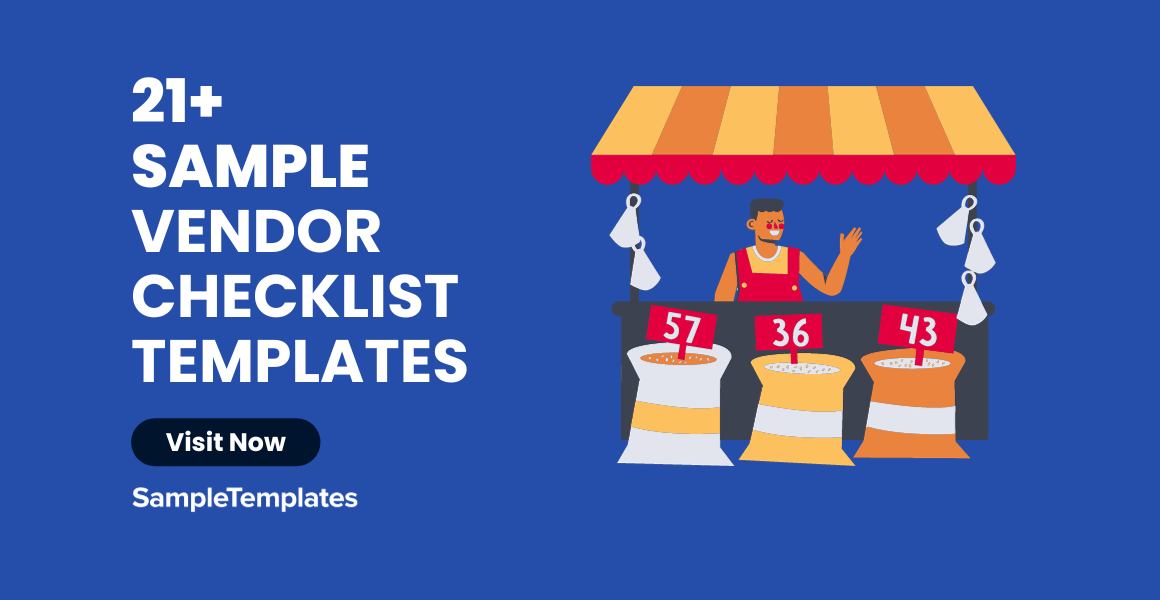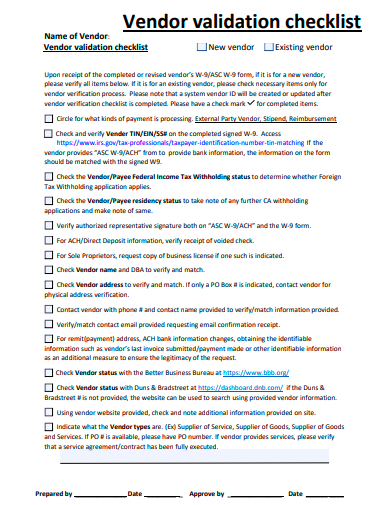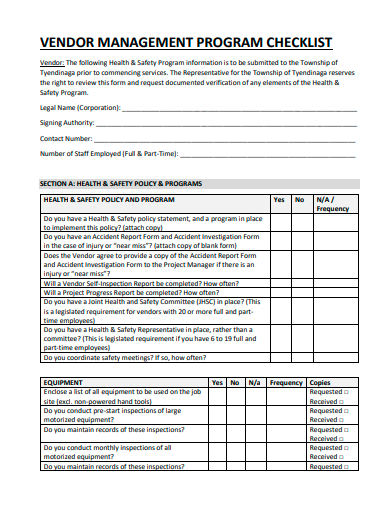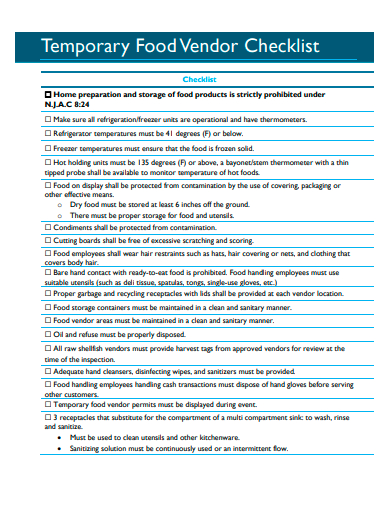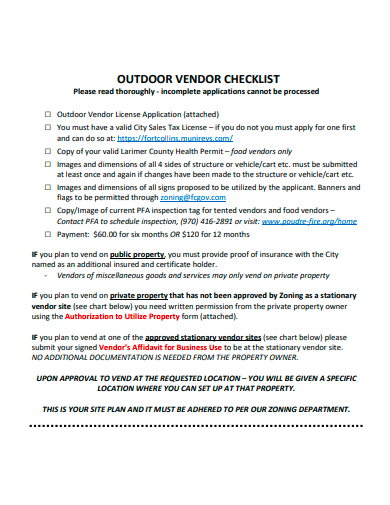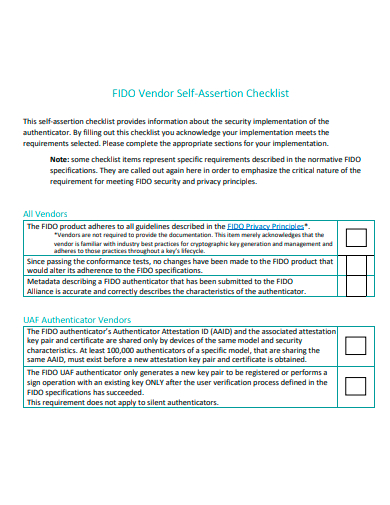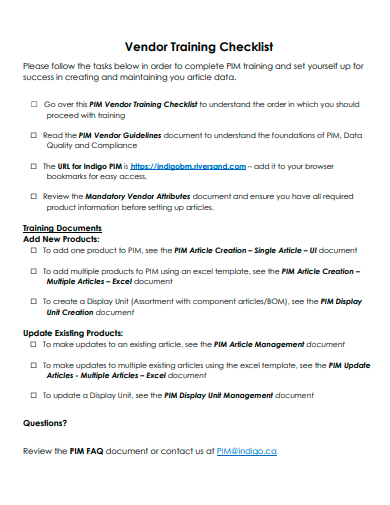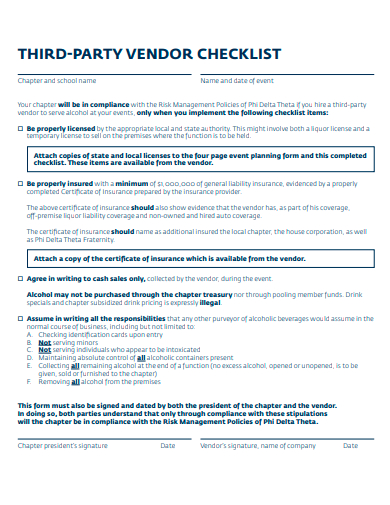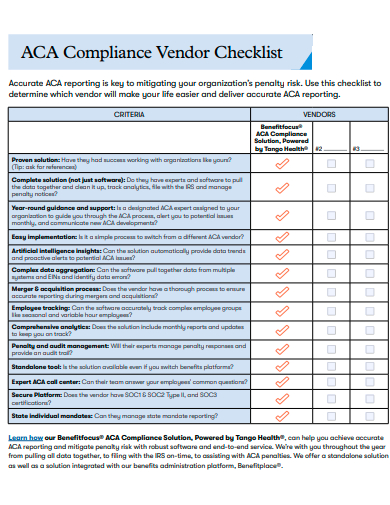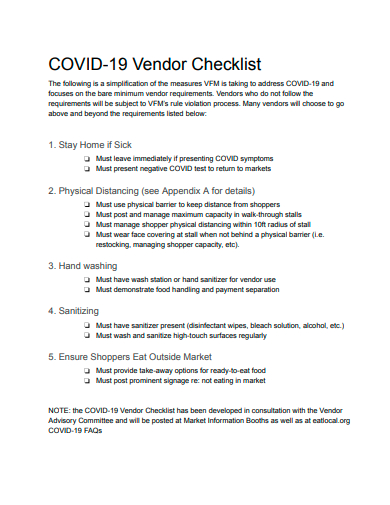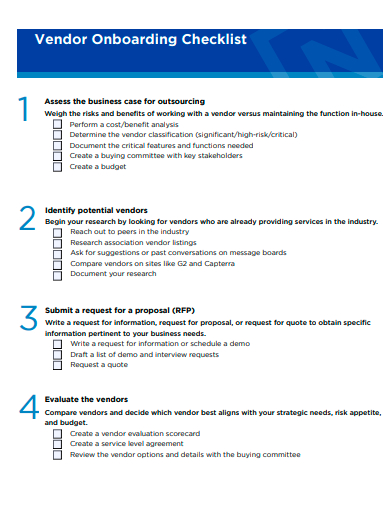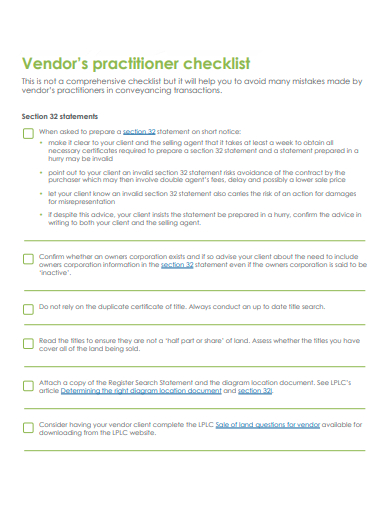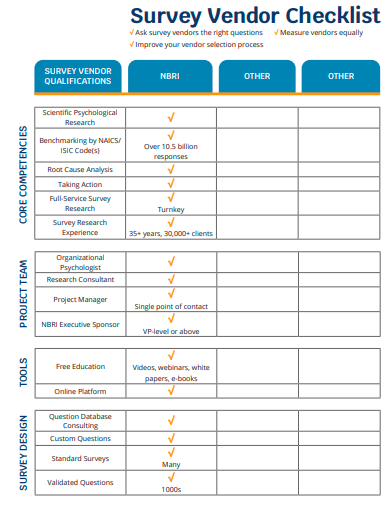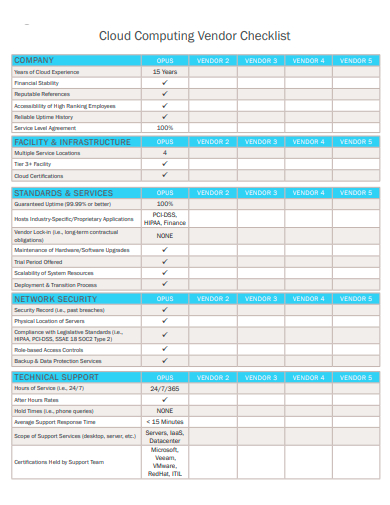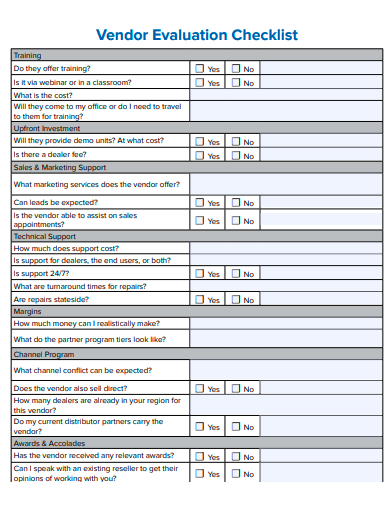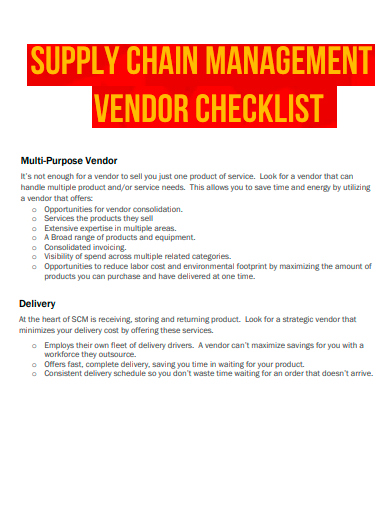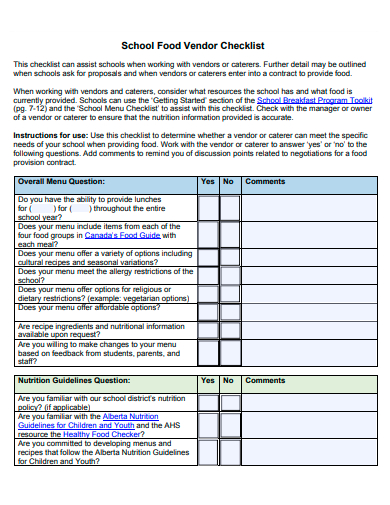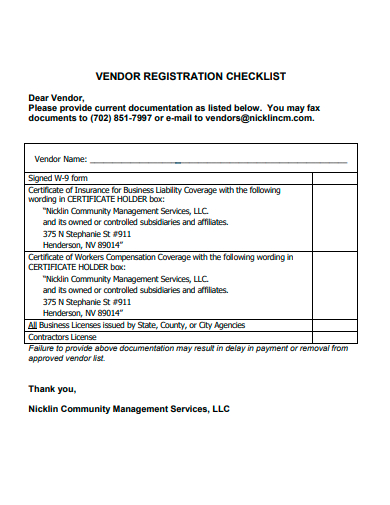In today’s dynamic business environment, selecting the right vendor can make or break a company’s success. The ‘Vendor Checklist’ serves as a comprehensive guide, ensuring businesses make informed decisions. Packed with crucial criteria, this tool prioritizes quality, reliability, and value for money. Whether you’re a startup or an established firm, leveraging this sample checklist will streamline procurement, mitigate risks, and guarantee optimal partnerships. Dive in to fortify your vendor selection process.
21+ Vendor Checklist Samples
1. Sample Wedding Vendor Checklist Template
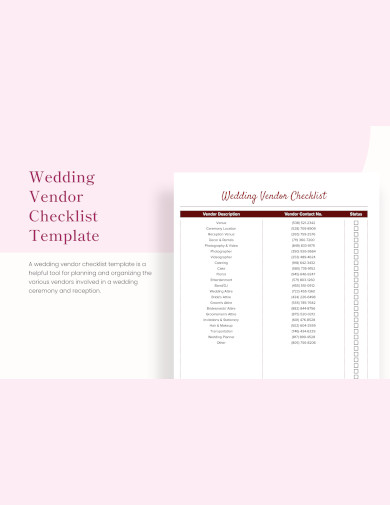
2. Sample Vendor and Supplier Checklist Template
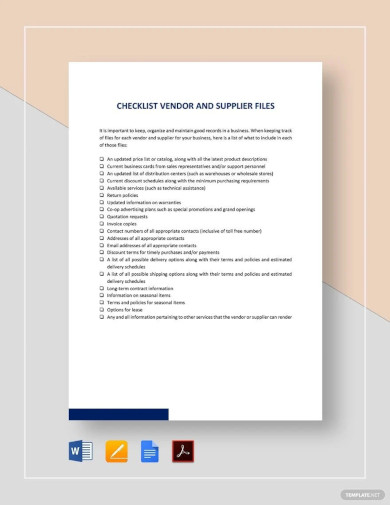
3. Sample IT Vendor Onboarding Checklist Template
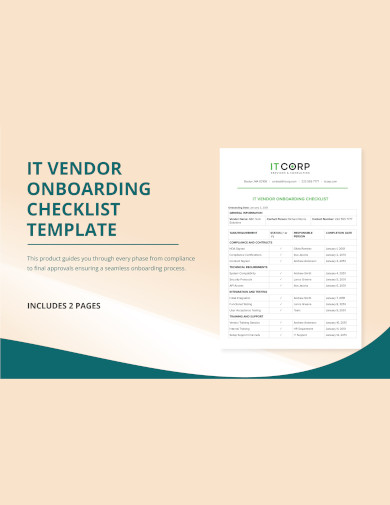
4. Sample Transport and Logistics Vendor Contracts Checklist
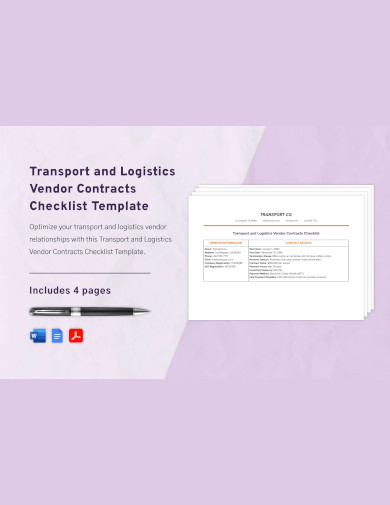
5. Printable Checklist Template
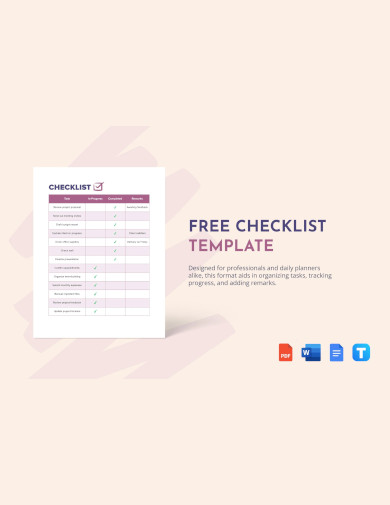
What is a Vendor Checklist?
A vendor checklist is a structured document or tool that lists out specific criteria, standards, or requirements that a supplier or service provider must meet or adhere to. This checklist is used during vendor selection, evaluation, and periodic review processes to ensure that they align with a company’s standards and expectations.
Importance of a Vendor Checklist
- Risk Management: One of the primary reasons businesses use a vendor checklist is to mitigate risks. Vendors can, directly and indirectly, impact a company’s reputation, finances, and operations. By assessing vendors before onboarding them, a company can identify potential areas of concern and avoid suppliers who might be unreliable or unfit for the job.
- Standardized Evaluation: With a checklist in place, businesses have a consistent framework to assess all potential vendors. This ensures that each vendor is judged by the same criteria, making the evaluation process more fair and systematic.
- Efficiency: Instead of relying on memory or informal assessments, a vendor checklist streamlines the vendor selection process. It offers a clear, step-by-step guide for evaluating vendors, ensuring no critical aspect is overlooked.
- Improved Negotiations: Having a clear understanding of what a business needs from its vendors, and where a vendor stands in relation to those needs, can lead to better negotiation outcomes. A company can clearly communicate its requirements and expectations, leading to more favorable terms and conditions.
Components of a Vendor Checklist
Company Overview
- Business History: Understand the vendor’s business longevity and reputation in the market.
- Financial Stability: Review financial statements or credit ratings to gauge the vendor’s financial health.
Product or Service Quality
- Certifications: Ensure that the vendor’s products or services have the necessary industry certifications.
- Quality Assurance Processes: Investigate the vendor’s internal processes for ensuring product or service quality.
Compliance and Ethics
- Regulatory Adherence: Confirm that the vendor complies with all relevant local, state, and international regulations.
- Ethical Standards: Ensure the vendor adheres to acceptable ethical standards, including labor practices and environmental considerations.
Operational Capacity
- Delivery Timelines: Evaluate the vendor’s ability to meet delivery schedules consistently.
- Scale Flexibility: Assess the vendor’s capability to handle increased orders or scale down when required.
Pricing and Contract Terms
- Competitive Pricing: Ensure the vendor’s pricing is competitive within the market while maintaining quality.
- Contract Flexibility: Review the contract’s terms, especially related to sample termination, renewals, and dispute resolution.
Customer Support and Responsiveness
- Communication: Gauge the vendor’s responsiveness and clarity in communication.
- After-sales Support: Investigate the quality of post-purchase support, including warranty claims, returns, and customer service.
Adapting the Checklist
It’s essential to understand that vendor checklists are not one-size-fits-all. Different industries and businesses will have unique needs. Regularly updating and refining the printable checklist based on changing business needs, market dynamics, and feedback ensures it remains a relevant tool in vendor management.
Why Every Business Needs a Vendor Checklist?
Ensuring Quality and Consistency
Using a checklist guarantees that every vendor is scrutinized based on a consistent set of criteria. This minimizes the risk of discrepancies and ensures a uniform quality standard.
Efficient Time Management
With a clear sample list, businesses can expedite their vendor evaluation process, ensuring no critical aspect is overlooked while minimizing unnecessary delays.
Reducing Business Risks
By systematically assessing potential partners, businesses can identify and avoid potential pitfalls, be they financial, operational, or reputational.
6. Sample Vendor Validation Checklist Template
7. Sample Vendor Management Program Checklist Template
8. Sample Temporary Food Vendor Checklist Template
9. Sample Outdoor Vendor Checklist Template
10. Sample Vendor Self-Assertion Checklist Template
11. Sample Vendor Training Checklist Template
12. Sample Third Party Vendor Checklist Template
13. Sample Compliance Vendor Checklist Template
14. Sample Covid-19 Vendor Checklist Template
15. Sample Vendor Onboarding Checklist Template
16. Sample Vendor Practitioner Checklist Template
17. Sample Survey Vendor Checklist Template
18. Sample Cloud Computing Vendor Checklist Template
19. Sample Vendor Evaluation Checklist Template
20. Sample Supply Chain Management Vendor Checklist Template
21. Sample School Vendor Checklist Template
22. Sample Vendor Registration Checklist Template
How do you Create a Vendor Checklist?
Managing vendors can be a multifaceted endeavor, especially when overseeing multiple suppliers for various aspects of a business. A vendor checklist can simplify the process, ensuring that you have all the necessary components in place for smooth vendor relationships. You can also see more templates like Vendor Audit Checklists. Here’s how you can create a comprehensive vendor checklist:
Step 1: Identify Your Needs
Start by identifying and listing down the specific needs and requirements for which you require a vendor. This could range from raw materials, software solutions, to marketing services. Categorizing these needs can offer clarity, allowing you to segment your checklist by the type of vendor, such as “IT vendors” or “Supply Chain vendors.”
Step 2: Research and Preliminary Screening
For each category of need, research potential vendors in the market. Create a list of possible vendors, then do a preliminary screening based on:
- Reputation and reviews
- Past client testimonials
- Experience in the industry
- Pricing structures
This step ensures that you have a curated list of potential vendors who meet a basic set of criteria.
Step 3: Delve into Detailed Evaluation
With your curated list, delve deeper into a more detailed evaluation. Your checklist for this stage should cover:
- Financial stability of the vendor
- Compatibility with your company culture and values
- Communication responsiveness and clarity
- Availability of customer support and after-sales service
- Legal and contractual elements, such as warranty, maintenance, and exit clauses
Step 4: Onboarding Procedures
Once you’ve selected your vendors, your checklist should transition to onboarding. Key points to consider are:
- Formalizing agreements: Ensure that sample contracts are clear, detailing every aspect of the engagement.
- Setting up communication channels: Determine the primary points of contact from both sides.
- Integration with your systems: This might involve software integration, training sessions, or setting up delivery sample schedules.
- Trial period: Consider setting up a test phase to gauge the vendor’s efficiency and the quality of their goods or services.
Step 5: Ongoing Monitoring and Review
A vendor relationship is not a “set it and forget it” arrangement. Periodically, you must evaluate the performance and service quality. For this, incorporate the following into your checklist:
- Regular performance reviews: Evaluate deliverables against the set benchmarks.
- Feedback loops: Create mechanisms to gather feedback from teams interacting with the vendor.
- Contingency plans: Have a backup plan ready for scenarios where the vendor may not be able to meet obligations.
What is Vendor Audit Checklist?
A vendor audit checklist is a tool used by businesses to systematically evaluate and assess the practices, processes, and compliance of their suppliers or third-party vendors. It ensures that vendors meet the company’s standards, regulatory requirements, and contractual obligations, helping to identify potential risks and areas for improvement in the vendor’s operations.
What is a Vendor Due Diligence Checklist?
A vendor due diligence checklist is a structured tool used by businesses to comprehensively assess and verify a vendor’s credentials, financial stability, operational capability, and compliance before entering into a contract or partnership. It helps in ensuring that the vendor is reliable, trustworthy, and aligns with the company’s standards and requirements.
In conclusion, a vendor checklist is a vital tool in a company’s arsenal when it comes to forging successful and risk-free partnerships with third-party suppliers and service providers. It offers a structured way to assess, monitor, and manage relationships, ensuring alignment with the company’s sample objective and standards.
Related Posts
FREE 18+ Facilitator Checklist Samples in MS Word | Google Sheets | PDF
FREE 18+ Complaint Checklist Samples in MS Word | Google Sheets | PDF
FREE 18+ Internship Checklist Samples in MS Word | Google Docs | PDF
FREE 18+ Statement Checklist Samples in MS Word | Google Sheets | PDF
FREE 20+ Voluntary Checklist Samples in MS Word | Google Sheets | PDF
FREE 18+ Summary Checklist Samples in MS Word | Google Sheets | PDF
FREE 14+ Sponsorship Checklist Samples in MS Word | MS Excel | PDF
FREE 18+ Conference Checklist Samples in MS Word | Google Sheets | PDF
FREE 17+ Lesson Checklist Samples in MS Word | Google Sheets | PDF
FREE 18+ Progress Checklist Samples in MS Word | Google Docs | PDF
FREE 18+ Enrollment Checklist Samples in MS Word | Google Docs | PDF
FREE 18+ Graduation Checklist Samples in MS Word | Google Sheets | PDF
FREE 15+ Consent Checklist Samples in MS Word | Google Sheets | PDF
FREE 18+ Submission Checklist Samples in MS Word | Google Docs | PDF
FREE 18+ Request Checklist Samples in MS Word | MS Excel | PDF
